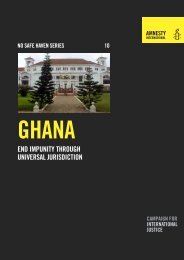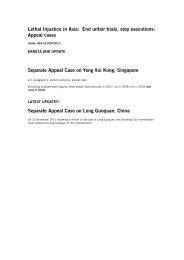read the report - Amnesty International
read the report - Amnesty International
read the report - Amnesty International
You also want an ePaper? Increase the reach of your titles
YUMPU automatically turns print PDFs into web optimized ePapers that Google loves.
NIGERIA<br />
‘WAITING FOR THE HANGMAN’<br />
41<br />
7/THE DEATH PENALTY IN LAW<br />
THE DEATH PENALTY IN NIGERIAN LAW<br />
Section 33(1) of <strong>the</strong> Nigerian Constitution guarantees <strong>the</strong> right to life. The same article,<br />
however, allows <strong>the</strong> state to execute its citizens “in execution of <strong>the</strong> sentence of a court in<br />
respect of a criminal offence of which he has been found guilty in Nigeria.” 149<br />
The death penalty is allowed in Nigeria under several sets of federal and state laws which<br />
operate alongside each o<strong>the</strong>r:<br />
<strong>the</strong> Penal Code and accompanying Criminal Procedure Code (CPC), 150 applicable in <strong>the</strong><br />
16 nor<strong>the</strong>rn states;<br />
<strong>the</strong> Criminal Code and accompanying Criminal Procedure Act (CPA), 151 applicable in<br />
sou<strong>the</strong>rn states;<br />
<br />
<strong>the</strong> federal Robbery and Firearms (Special Provisions) Act;<br />
<br />
Shari’a penal legislation in 12 nor<strong>the</strong>rn states.<br />
The Criminal Code and Penal Code were enacted as federal laws and each state has<br />
re-enacted <strong>the</strong>ir provisions as state laws. Most offences fall under state jurisdiction.<br />
Under Nigeria’s penal legislation, <strong>the</strong> following crimes carry a mandatory death sentence:<br />
treason; homicide; murder and culpable homicide punishable with death; and armed<br />
robbery. Under <strong>the</strong> Robbery and Firearms Act, anyone found guilty of robbery and armed<br />
with firearms, in <strong>the</strong> presence of an armed person, or causing violence or wounds, will be<br />
sentenced to death. In addition, under <strong>the</strong> Shari’a penal codes, rape, sodomy and adultery<br />
are also punishable with death. 152<br />
The Supreme Court confirmed in 1998 that section 30(1) of <strong>the</strong> 1979 Constitution, which is<br />
section 33(1) of <strong>the</strong> 1999 Constitution, was <strong>the</strong> legal basis for <strong>the</strong> validity of <strong>the</strong> death penalty<br />
in Nigeria. It “permits it in <strong>the</strong> clearest terms, so long as it is inflicted pursuant to <strong>the</strong> sentence<br />
of a court of law in Nigeria in a criminal offence.” 153<br />
Index: AFR 44/020/2008 <strong>Amnesty</strong> <strong>International</strong> October 2008

















